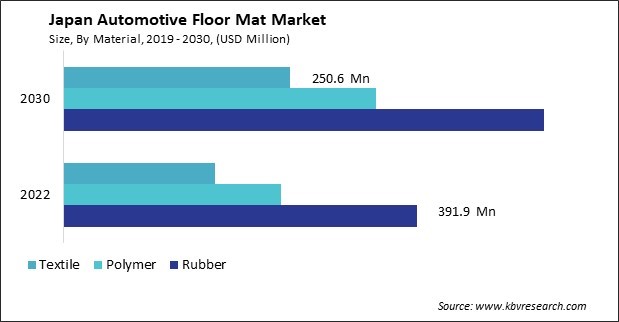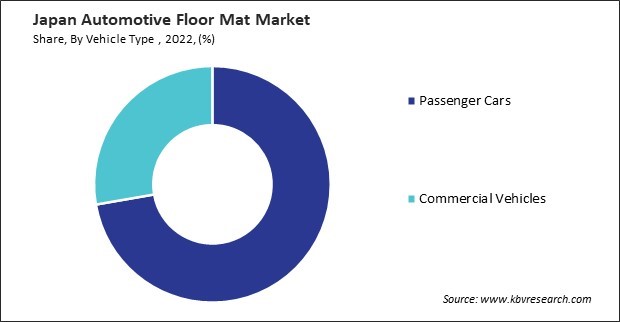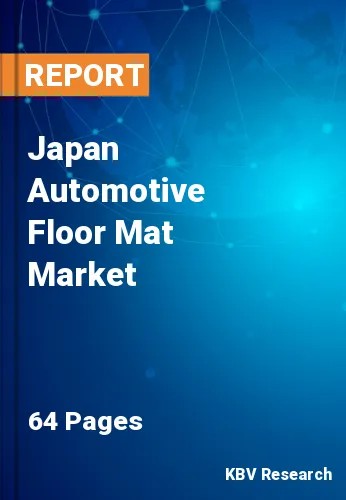The Japan Automotive Floor Mat Market size is expected to reach $1.1 billion by 2030, rising at a market growth of 4.0% CAGR during the forecast period. In the year 2022, the market attained a volume of 17,675.9 thousand units, experiencing a growth of 3.4% (2019-2022).
Japan's automotive floor mat market is a significant segment within the country's automotive accessories industry. As a nation with a strong automotive culture and many vehicles on the road, Japan represents a lucrative industry for various automotive-related products, including floor mats. Japanese consumers place a high value on maintaining the cleanliness and aesthetics of their vehicles, and automotive floor mats play a crucial role in protecting the interior from dirt, mud, and wear. The industry offers a diverse range of floor mats, including all-weather mats, carpeted mats, and custom-fit mats tailored to specific car models.

Government regulations related to vehicle safety and cleanliness also play a role in shaping the automotive floor mat market in Japan. Compliance with standards and regulations ensures that floor mats meet safety requirements and do not interfere with the operation of vehicle pedals. As the automotive industry continues to evolve with the introduction of electric vehicles (EVs) and advanced technologies, Japan's automotive floor mat market is likely to witness innovations to accommodate the specific needs of these vehicles.
Within the Japanese automotive floor mat market, there's a notable emphasis on quality and durability, reflecting the meticulous nature of Japanese consumers when it comes to maintaining their vehicles. Consumers who prioritize longevity and ease of maintenance prefer mats made from high-quality materials, such as durable rubber compounds or advanced synthetic fibers.
In Japan, the automotive floor mat market is experiencing a surge in demand for OEM (Original Equipment Manufacturer) and aftermarket sales. The growing automotive industry in the country has led to increased production of vehicles, contributing to the demand for OEM floor mats. Original Equipment Manufacturer floor mats are specifically designed and produced by the vehicle manufacturer, ensuring a perfect fit and high-quality materials that align with the overall design and specifications of the vehicle. As Japanese consumers continue to prioritize aesthetics and customization options for their vehicles, OEM floor mats offer a seamless integration that enhances the overall interior aesthetics of the cars.
Simultaneously, the aftermarket segment is witnessing a significant uptick in sales. Japanese consumers are increasingly seeking aftermarket floor mats that provide additional features, styles, and customization options beyond what OEM offerings provide. Aftermarket floor mats cater to diverse consumer preferences, offering various materials, colors, and designs. The aftermarket segment is also characterized by its flexibility, allowing consumers to replace or upgrade their existing floor mats with products that better suit their tastes or changing needs.
According to the International Trade Administration, the total Japanese EV sector stands at 27,000 units in 2018, a 250% increase during the past ten years. About 97% of EV sales in Japan in 2018 were Nissan Leaf. The Nissan Leaf brand is synonymous with EVs in Japan and is expected to grow in the foreseeable future as the EV category grows. Zero Emission Vehicles (ZEV) are a global trend in the automotive industry, and OEMs are working on alliances to be successful in this competitive industry. Toyota Prius used to be the leading pioneer of HV and still has 13% of the industry share in this category. Still, many OEMs are introducing new HV brands, making the Japanese HV sector quite saturated. Therefore, this dual growth trend in both OEM and aftermarket sales reflects the dynamic and evolving nature of the automotive floor mat market in Japan, driven by a combination of industry expansion and consumer demand for personalized vehicle accessories.
The automotive floor mat market in Japan is undergoing a transformative revolution with the integration of 3D printing technology. This innovative manufacturing process has brought about significant advancements in designing, producing, and customization of automotive floor mats. Traditional manufacturing methods are being replaced by 3D printing, allowing for the creation of highly intricate and personalized floor mat designs that cater to the preferences of individual car owners.
One of the key advantages of 3D printing in this industry is its ability to produce lightweight yet durable floor mats with intricate patterns and textures in Japan. Car owners now choose designs, colors, and materials to match their vehicles' interiors. This customization enhances the overall driving experience and provides a unique selling point for automotive accessory retailers. Furthermore, 3D printing enables a more sustainable and efficient production process, reducing material waste and energy consumption. Hence, as this technology becomes more widely adopted, it is expected to enhance the overall quality of automotive floor mats and revolutionize Japan's automotive accessories industry, setting new standards for customization and consumer satisfaction.
According to the International Trade Administration, Japan's additive manufacturing or "3D printing" equipment sales totaled $168.6 million in 2020. Japan's total additive manufacturing/3D printing equipment sales, including printing supplies and services, was 30.8-billion-yen (about $ 291.1 million) 2017. As 3D printing continues to gain prominence, its influence on manufacturing processes within the automotive sector becomes increasingly relevant. The ability to create intricate and customized components aligns with the automotive industry's quest for precision and efficiency. One specific area where this convergence is notable is in automotive floor mats.

Japan's automotive floor mat market is a dynamic and competitive sector that is crucial in enhancing vehicle interior aesthetics and functionality. Japanese consumers, known for their high standards of quality and meticulous attention to detail, demand floor mats that protect the vehicle's flooring and complement the overall design. Prominent Japanese automotive floor mat market companies include Toyota Boshoku Corporation, Suminoe Textile Co., Ltd., and Ichikoh Industries, Ltd. These companies leverage advanced manufacturing technologies and innovative materials to produce floor mats that meet stringent quality standards.
Toyota Boshoku Corporation stands out as a major player in the Japanese automotive floor mat market, with a reputation for producing premium interior components for Toyota vehicles. The company's floor mats are designed not only for durability and ease of cleaning but also for their ability to enhance the overall driving experience. Suminoe Textile Co., Ltd., on the other hand, specializes in developing cutting-edge materials for automotive interior applications, including floor mats. With a focus on sustainability, the company incorporates eco-friendly materials and manufacturing processes into its floor mat production, aligning with the growing global emphasis on environmental responsibility.
Ichikoh Industries, Ltd., is recognized for its commitment to innovation in automotive accessories, including floor mats. The company continually invests in research and development to introduce new materials and design concepts that cater to evolving Japanese consumer preferences. Advanced features such as enhanced grip, noise reduction, and customizable designs are key aspects that set Ichikoh Industries apart in this industry. Collectively, these companies contribute to the vibrant landscape of the Japanese automotive floor mat market by continually pushing the boundaries of design and functionality.
By Material
By Vehicle Type
By Sales Channel
Our team of dedicated experts can provide you with attractive expansion opportunities for your business.

